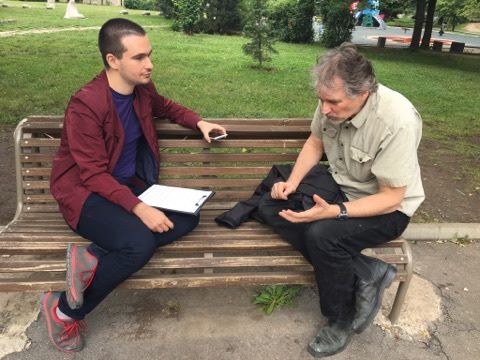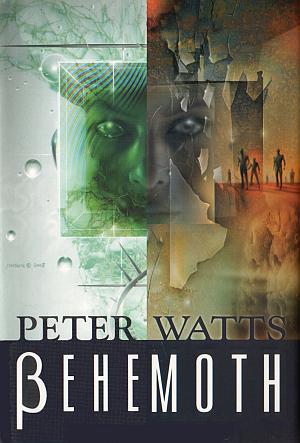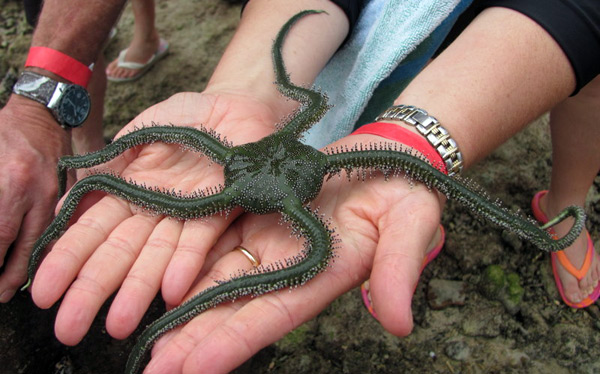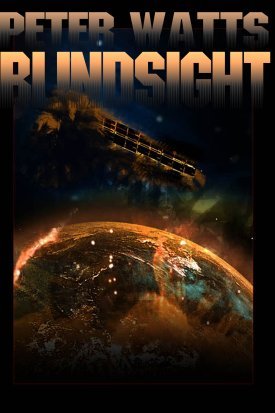
An interview with Peter Watts – Part 3
If you want to become a writer, take a look at this guy’s story!
Are you enjoying summer? We certainly are. That’s why it’s taking us so long to publish the 4 parts of the interview. But nevertheless, here is the penultimate third part, where Peter Watts tells me his personal history as a writer so far and his favorite works, including ‘Rifters’, ‘Blindsight’ and how the latter became successful.
If you want to read the other parts of the interview:
- For Part 1 click here;
- For Part 2 click here;
- For Part 4 click here;
А за версията на български, кликнете тук.

Do you still indulge in scientific studies or do you devote more time to writing nowadays?
I’m pretty much a full time writer. Every now and then, and that kinda pisses me off, when I get back home I do some statistical analysis for Ducks Unlimited. Back in the day when I left academia, that kind of consulting work paid my bills while I was still writing, still trying to make a career out of it. But these days it’s really more of a distraction. I don’t resent doing it, because it’s the kind of work that kept me alive back before I was making living of writing. Now that I’m making living of writing I’m kind of irritated by the fact that I still occasionally have to do science, because it’s not exciting science, it’s just number crunching. I’m not doing research really, I’m doing statistical analysis.
Other than that, the closest I’ve got to science recently was back in 2006. I went back and did a post doc in Molecular Genetics, DNA barcoding. But I completely sucked at it, I worked for 2 solid years and didn’t get a single decent result. It turned out that the guys, that were sending us the samples, were sending them in denatured alcohol, and denatured alcohol destroys DNA. So that’s probably a big part of why I didn’t get any results. Nonetheless, I sucked at it.

Back when you were beginning to write, was it hard to find a publisher and an audience?
Well, back when I was beginning to write I was like in grade 3, so… (laughs). Yeah, it was hard. I’ve been writing, not that I’ve been writing publishable stuff, but I’ve been writing since I was, you know, 8 or 9 years old. I’ve been writing big stuff since I was in grade 10. I started getting my first rejection slips when I was in grade 12, early university. I got my first rejection from a magazine I hadn’t actually even submitted anything to, in the early 1980’s.
How do you get a rejection if you haven’t submitted anything?
It’s pretty wild, isn’t it? (laughs) Yeah, it was ‘Analog’. I had sent a story to ‘Asimov’s’, because I didn’t think that my science fiction was hard enough for ‘Analog’. So I sent it off to ‘Asimov’s’ and they thought it was too grim and futile and downbeat. But they thought that ‘Analog’ might like it, so they passed it on without telling me. And ‘Analog’ got back to me before they did. I was still waiting to hear from ‘Asimov’s’, right, and then I get a letter from ‘Analog’, like, „Hi, we don’t want your story“ (laughs). And I was like „When have I ever sent you a story?“ And they too said „Yeah, it’s a really good story and it shows a lot of potential, but it does seem awfully gloomy and downbeat at the end and everybody just gets squashed. We thought about bringing some clowns at the end“. So that marked the beginning of about 10 years of me getting rejection letters from people saying „We like the story, but bring in clowns at the end, because it’s too depressing“.
I got my first story ever published in 1991. And I had been seriously writing stories for over a decade at that points, I mean, not counting the shit I was doing back when I was a kid. I had been sending stuff off and trying to hold my crap while getting degrees for 10 years before I published my first story. And then it was another 8 or 9 years before I published my first novel. And from that point on, oddly enough, I was pretty much self-supporting. I mean I still got a fair amount of my income from consulting, but „Starfish“ did well enough that my publisher offered me three times as much to do a sequel. And the sequel did as well, but then the third book just absolutely tanked. I figured it was basically the end of my career.
‘Blingsight’ would have tanked – my career would have been over with ‘Blindsight’ – if I hadn’t given it away for free. Because they didn’t promote it, they wrote it off as dead on arrival, they were contractually obligated to release it, but they didn’t like it much, they got a really crappy cover art, the print run was, like, two… So it wasn’t until I started giving it away that it started getting noticed. It suddenly sort of took off and even now it’s still getting reprinted in other languages. It’s coming out in Ukrainian in a few months. So yeah, really, from 2001 on I was pretty much making my living of writing.
So that was actually the deciding move, when you released ‘Blindsight’ for free?
No, at that point I just figured that my writing career was over. By giving my book away for free, I was breaking my contract. And I figured, you know, who cares if I break my contract – they are continually changing the goal post. They said they were gonna go for a second print and they kept changing the reasons why they were not going for second printing. „Obviously, they want this book to fail“ was my thinking. So fuck it. Nobody else is going to publish me. They are obviously not… Even though this book was doing very very well critically, this book was a bestseller in genre-bookstores for several weeks based on no sales at all, because nobody had any inventory, because the print run was so low. But it just got such good word of mouth that people were ordering the book and it was becoming a bestseller even in stores where they didn’t have any copies to sell. People were doing it backwards. And Tor still wasn’t going for a second printing. And at that point I was thinking, for whatever reason, I’d had my shot as a science fiction writer, I’d written four novels, I had a good run – that’s it. I’m gonna have to go back to selling running shoes or be a marine biologist if I still can. In the meantime, I have a choice between writing a book that nobody’s going to read and it will be the end of my career, or I have a choice of setting this book free. I’ll still have no career, but at least everyone will be able to read the book. There was never a scenario in which I give a book away and all of the sudden the sales triple and it becomes a relatively influential book.
But that’s how it happened.
Yeah, that’s what happened, that’s how it really took off. That was never anything that would have occurred to me in my wildest dreams.
So your first series was „The Rifters“?
Yeah.
We don’t have it in Bulgarian yet, can you tell us something about those books?
It’s a lot of deep sea stuff. Basically it was a combination of me trying to work out some angst about a girlfriend that I had a bad relationship with and put her as a character in this book…

Did she die horribly?
I tried to make her die horribly, but my american publisher refused to allow her to die at the end, because american audiences wouldn’t accept such a downbeat ending, so she had to end triumphantly. And then she survived for like two more novels.
There was that plus there was the whole idea of… I had noticed throughout the course of my time in academia that there were two kinds of people. There were the people, who were actually healthy and well-adjusted, they worked in the week and then they went home and had good home life and families and stuff. And there were these guys, who were totally fucked up in the head. They never stopped working, And they abandoned their families. And they ignored their wives. And they spent their entire times trying desperately to gain the approval of their distant father, who never forgave them for not going to the family practice of medicine and becoming a parasitologist instead. These were the people that were making all the breakthroughs. They were not the people you want to hang out with, they were not people you would ever invite to parties, they were assholes, but they were driven. And it suddenly occurred to me, that it’s the outcasts that are making the progress here, it’s the people who are fucked in the head that are making the progress.
So I wrote the first ‘Rifters’ novel as a kind of a metaphor for that. You have these people who are all fucked in the head and they are running deep sea power stations that are keeping the continent alive, keeping the lights on back home. Nobody likes them, they are all damaged in various ways, they are stuck down at the bottom of the sea in a sort of weird monster filled hydrothermal vent environment that I invented. And they were the metaphor for the people fucked in the head upon which the civilization is built. The tagline is „The civilization is built on the back of its outcasts“. The question was what happens when they realize „Hey, we may be outcasts, but we got our hands on a kill switch for the whole power grid, maybe we got more power than we thought we did“ and how that plays out. And it was only supposed to play out over one book, but it did well, so they wanted me to write more, so I did. And I continued to write the books until they tanked and nobody wanted them anymore…
So would you say that they made you write the sequel or did it come naturally?
It would have been natural to continue to write stories set in the deep sea. I didn’t want to get into a rut. The great thing about the first book was that 90% of it took place in this little undersea habitat and the area right around it. It was like a one-set stage play. So I could hint about what the world was like back on the shore, but I didn’t really have to show all that much. Plus, I had just finished my PhD in marine biology, I knew stuff about the deep sea, all the cool stuff there, so I included them. The first book ends essentially with that station being blown up by a tactical nuclear weapon. One person drags herself back on shore hundreds of kilometers through the ocean, and she’s infected by this weird alien microbe that has always been restricted to hydrothermal vents for various reasons, but she basically brought it back with her. Now that it’s loose on land it will basically lay waste to any kind of DNA-based life form. She survives just long enough to get back onto land, she drags herself up onto the shore, she bleeds out and she dies. And as she’s bleeding out all these little microbes basically debark and start spreading out. That’s the end of the book and it’s implied that that’s pretty much the end of the human race and in fact all DNA-based life.

And that was cool, it was apocalyptic and I didn’t know what I was going to write next. But they wanted a sequel, it was „okay, now she’s up there so now I have to describe the world at large“ and that was a much harder task. I also wanted to make it different, I didn’t want to just keep writing the same book over and over again. Some people liked it better. I think most people think ‘Starfish’ was a better book, but I don’t know if it was actually a better book or just everybody loved ‘Starfish’ and they were expecting more of ‘Starfish’, but they got clobbered over the head by something that had completely different pacing, that had more action and plot than character study. It was like it was not written by the same person. I still think it’s a good book, but I think the consensus among readers is that ‘Starfish’ is better.
But you don’t regret writing it?
No, I don’t regret. I don’t even regret writing ‘Behemoth’, which was my tankiest book and many people found it politically objectionable, because they thought that there was a lot of sexual violence and so on in there. Personally, I don’t see how you can depict a character, who is a sexual sadist, without showing some acts of sexual sadism. One of the main rules of writing is „show, don’t tell“. I could either have people constantly pointing to this character, saying „Oh, he’s a sexual sadist“, but never have him do anything, or I could show some acts of sexual sadism. I didn’t really see a middle ground there.
But I didn’t want to write that book there. I had finished ‘Maelstrom’. And by that time I was wanting to write ‘Blindsight’. I still didn’t know how ‘Blindsight’ was gonna fit together, but I wanted to start focusing on that nature of consciousness then. My agent at the time said „No, you’ve gotta go with the proven formula, right? This is a good series, you wanna keep pumping out books in the same series“. But I was kind of exhausted. Two books set in the same world with the same characters… My batteries were drained, I didn’t wanna write again in that. I didn’t have anything new to say in that. I had lots of loose ends I could tie up. I could tell a story, but both ‘Starfish’ and ‘Maelstrom’ introduced a whole bunch of new ideas and ‘Behemoth’ took those ideas and ran with them and tied off the loose ends, but didn’t really introduce much new in the way. It maybe had one or two new ideas of its own, but it wasn’t as idea-dense. I still think it’s a perfectly adequate novel, but I wrote it when my heart wasn’t really in it.
The question now is, if I had it my way, if I hadn’t written it and if I started writing ‘Blindsight’ back then, would ‘Blindsight’ have been any good? Writing ‘Behemoth’ taught me a lot, plus there was a lot of research that came out in those few years about the nature of consciousness and stuff. If I had written ‘Blindsight’ earlier, I wouldn’t have been able to point to this paper-end science that says „Look, consciousness is an impairment problem solving“. It wouldn’t have been as current, I wouldn’t have been inspired by this much real world research, because there wasn’t this much real world research out there.

So it’s probably just as well that I waited as long as I did to write ‘Blindsight’. But, yeah, I always wondered what would have happened in some parallel timeline, where I would have switched the order of those two books. I bet I could have done a much better job on ‘Behemoth’, if I had just come at it when I was feeling more enthused about it.
Which among your works is your favorite, do you have one?
I think ‘The Island’ is pretty cool. I’m pretty fond of the one I’ve finished now, it’s set in the same world as ‘The Island’. I haven’t gone and reread any of my ‘Rifters’ stuff. I mean, I have to say, obviously, ‘Blindsight’ is the favorite, because it’s the one that put me on the map.
Is it your biggest bestseller?
Oh, yeah, by far. If anyone has heard about me at all, they’ve generally heard about me because of ‘Blindsight’. But the fact is, when I finished it, I wasn’t sure it was any good. I thought it was too turgid, I thought it was just a bunch of people sitting around and talking. I thought there were parts of it that were good, but I thought that it was too talky. I was kind of amazed when people found it as compelling as they did. I know it was a difficult book, as everyone knows.
I do like a lot of my shorter stuff – ‘The Things’, ‘The island’… As for my favorite, I don’t know, I like to thing that maybe ‘Omniscians’ will be my favorite, but I haven’t started writing it yet, so…
More on Peter Watts’s writing process and entertainment habits next time!

